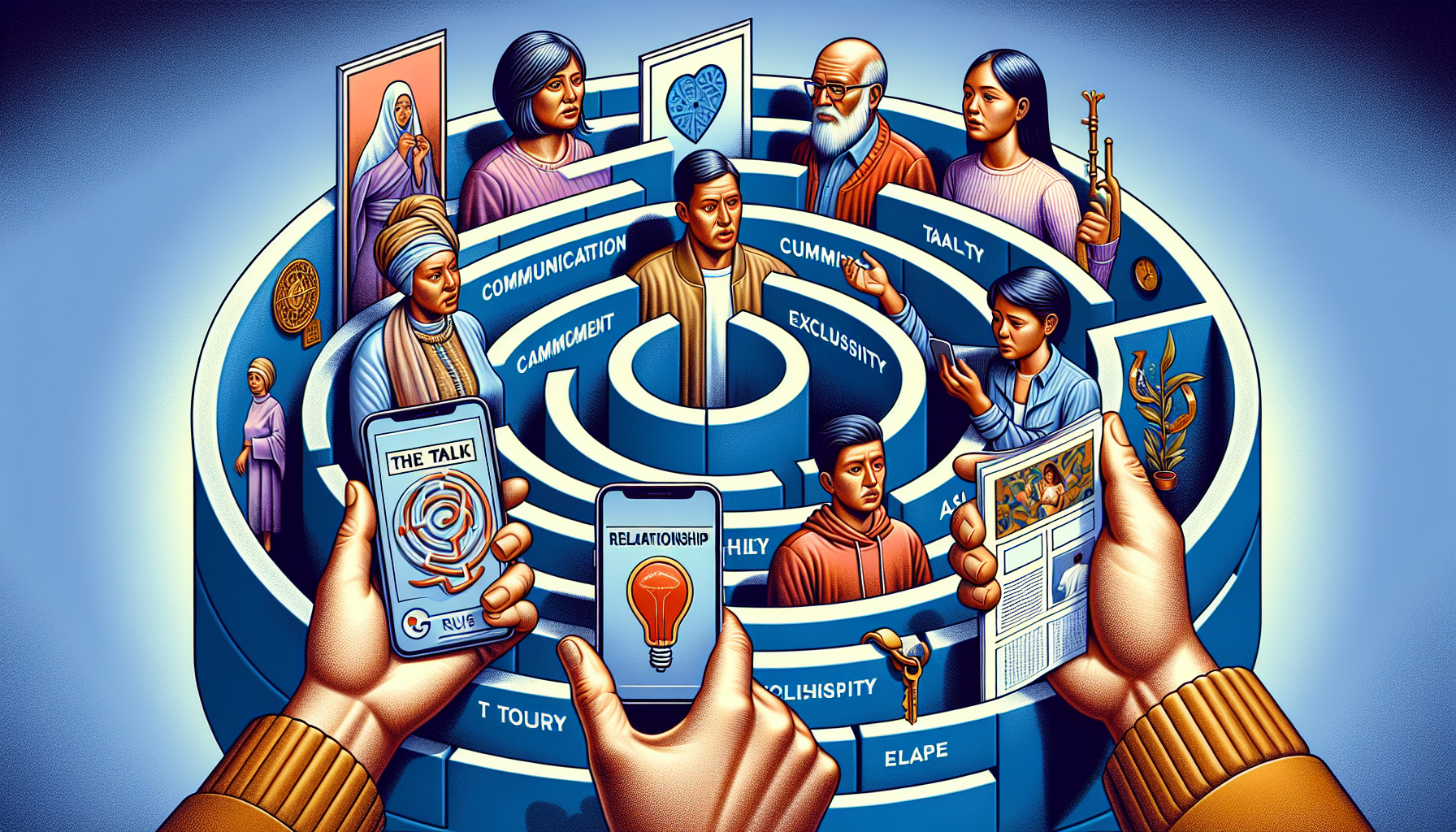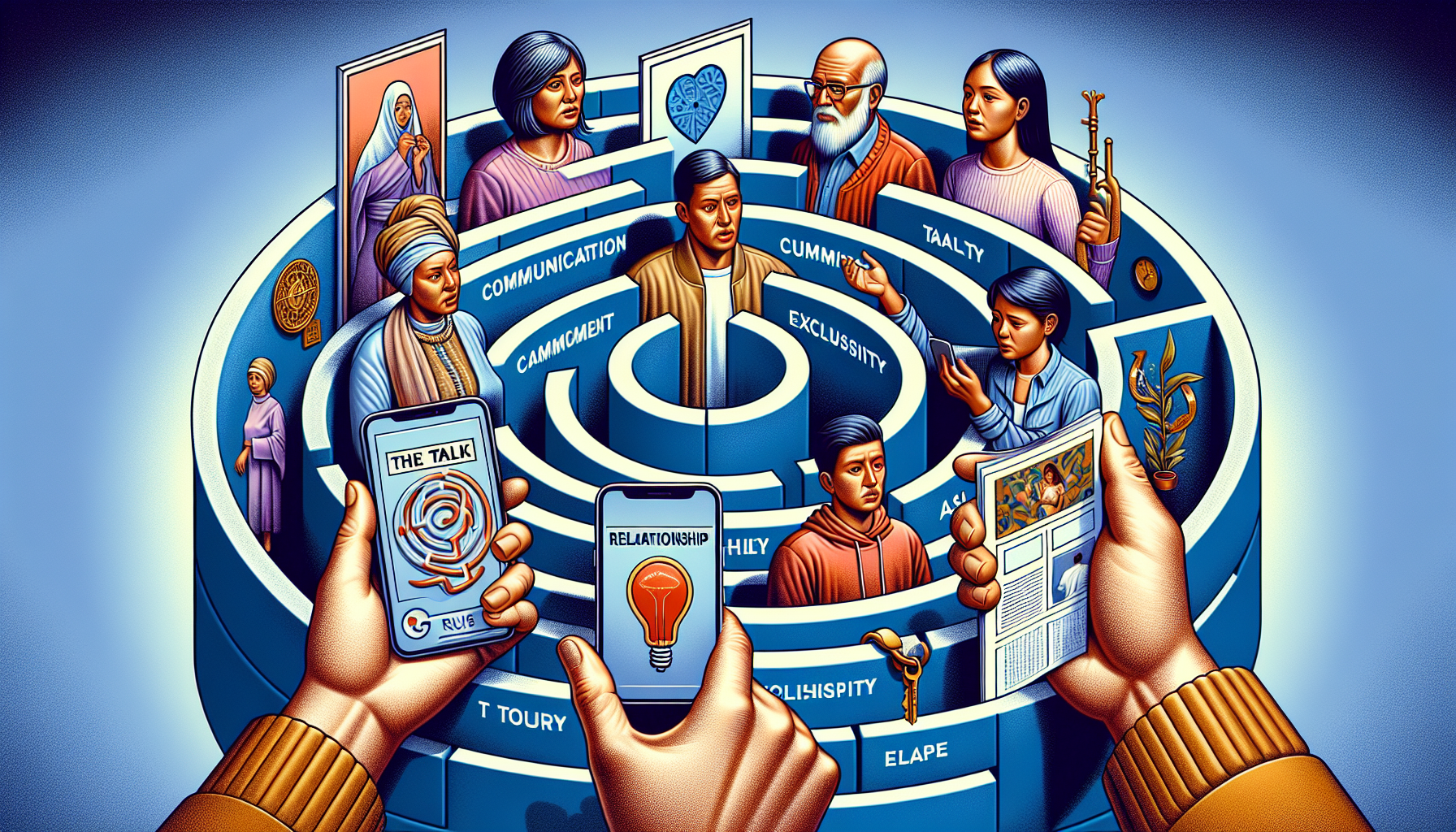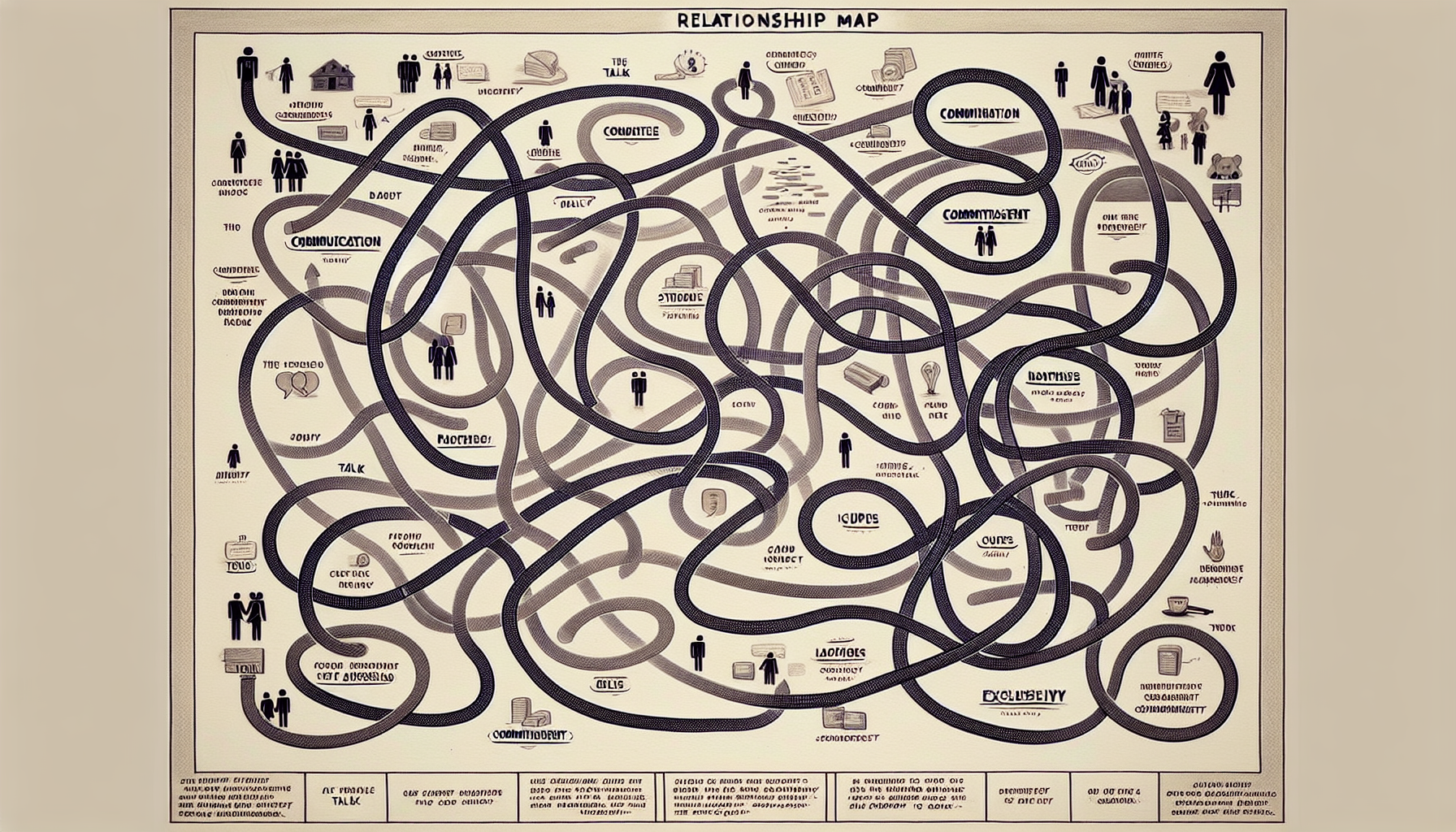
So, you’ve found yourself in a new relationship, and now you’re wondering how to define it. It’s a common predicament, my friend. The beauty of relationships lies in their unique nature, and there is no one-size-fits-all answer to this question. But fear not, for in this article, we will explore some helpful tips and ideas to guide you in defining that special connection you’ve discovered. Whether you’re looking for clarity or seeking to navigate the ever-evolving landscape of relationships, we’ve got you covered. Let’s embark on this journey of understanding together!
Understanding the Importance of Defining a Relationship
Why is it necessary to define a relationship?
Defining a relationship is essential because it creates a clear and mutual understanding between the people involved. When you define a relationship, you establish the foundation upon which both individuals can build trust, respect, and commitment. Without a defined relationship, confusion and misunderstandings can arise, leading to hurt feelings and unmet expectations.
The benefits of defining a relationship
Defining a relationship offers numerous benefits. Firstly, it provides a sense of security and stability as both individuals know where they stand. It allows you to openly communicate about your needs, desires, and boundaries, fostering a deeper level of emotional intimacy. By defining the relationship, you can also establish shared goals and aspirations, enabling both parties to work towards a common future. Additionally, defining a relationship allows for a healthier dynamic, as it encourages open and honest communication, sets realistic expectations, and facilitates problem-solving.
Common misconceptions about defining a relationship
There are several misconceptions surrounding defining a relationship. One common misconception is that it is unnecessary or too early to have a conversation about the status of the relationship. However, defining a relationship is not about rushing into commitment; it is about establishing clear communication and understanding. Another misconception is that defining a relationship will ruin the spontaneity or excitement. On the contrary, defining a relationship provides a solid foundation for trust, which can actually enhance the spontaneity and excitement within the relationship. It is important to debunk these misconceptions and recognize the benefits that come with defining a relationship.
When Should You Define a Relationship?
Early stages of dating
While there is no specific timeline for when to define a relationship, it is generally advisable to have this conversation earlier rather than later. This allows both individuals to align their expectations and avoid any misunderstandings regarding exclusivity or the nature of the relationship. However, it is crucial to exercise sensitivity and not rush this conversation, as each relationship progresses at its own pace.
Signs that indicate it’s time to define the relationship
Certain signs can indicate that it is time to define the relationship. If you find yourself spending a significant amount of time together, becoming emotionally invested, and wanting to introduce your partner to friends and family, these are positive signs that the relationship is developing. Additionally, if you notice a shift towards exclusivity, such as both parties expressing a desire not to date others, it may be an appropriate time to discuss the status of the relationship.
The consequences of delaying the discussion
Delaying the discussion about defining a relationship can lead to confusion, frustration, and potential misunderstandings. Without clear communication, one or both individuals may have different expectations, leading to disappointment or hurt feelings. Additionally, delaying the conversation can prevent the relationship from progressing naturally and hinder the development of trust and intimacy. It is important to address the topic in a timely manner to ensure the relationship is built on a solid foundation.

Preparing Yourself for the Conversation
Self-reflection: understanding your own needs and expectations
Before engaging in the conversation about defining the relationship, take some time for self-reflection. Understand your own needs, desires, and expectations from a committed partnership. Consider what values and qualities are important to you and what you envision for your future. This self-awareness will help you communicate your desires effectively and ensure a successful conversation.
Identifying the purpose of the conversation
Clarify the purpose of your conversation. Are you looking to establish exclusivity? Are you seeking a long-term commitment? Understanding your intentions will help frame the conversation and ensure both individuals are on the same page. Be prepared to be honest and vulnerable about your desires, as this will lead to a more authentic and productive discussion.
Choosing the right time and place
Selecting the appropriate time and place for this conversation is crucial. Find a comfortable and private setting where both individuals can openly express themselves without distractions. Avoid having the conversation during stressful or emotionally charged situations, as this may hinder effective communication. Choose a time when both of you are calm, relaxed, and able to give the discussion your full attention.
Considering the potential outcomes
It is important to acknowledge that the conversation about defining a relationship may have different outcomes. While both parties may desire the same level of commitment, it is essential to be open to the possibility of differing viewpoints. Consider the potential outcomes and be prepared to manage your expectations accordingly. Remember that open and honest communication is key, regardless of the specific outcome.
Key Factors to Discuss and Clarify
Defining the nature of the relationship
One of the primary factors to discuss is the nature of the relationship. Determine if you are both seeking a casual dating experience, an exclusive partnership, or something more serious. This conversation allows both individuals to align their expectations and ensure they are on the same page.
Clarifying expectations regarding exclusivity
Understanding each other’s expectations regarding exclusivity is crucial to avoid misunderstandings or hurt feelings. Discuss whether you both want to be exclusive and committed to each other or if you are open to dating others. Clarifying this aspect helps establish trust and avoids unnecessary complications.
Determining the level of commitment
Discuss the level of commitment desired by each individual. Are you both looking for a committed, long-term partnership or are you more comfortable with a more casual arrangement? Clearly defining the level of commitment ensures that both parties are aware of what is expected and can make informed decisions about the future of the relationship.
Discussing future goals and aspirations
It is important to have a conversation about future goals and aspirations within the relationship. Talk about where you see yourselves individually and as a couple in the months and years to come. This discussion will help determine if your respective goals align and if you are compatible in terms of your long-term vision.
Addressing communication and conflict resolution
Openly addressing communication styles and conflict resolution within the relationship is crucial for establishing a healthy dynamic. Discuss how you both prefer to communicate, how you handle disagreements, and how you can support each other during challenging times. This conversation sets a strong foundation for effective communication and strengthens the relationship.

Navigating Difficult Questions and Concerns
Dealing with fear of rejection or commitment
It is common to experience fear of rejection or commitment when defining a relationship. Be honest with yourself and your partner about these fears. Share your concerns, but also remind yourself of the potential rewards of taking this step. Being vulnerable allows for deeper emotional connection and growth.
Handling differing relationship timelines
Sometimes, individuals may have different timelines for when they are ready to define the relationship. If this occurs, it is important to openly communicate and find a compromise. Understand each other’s perspective and consider the reasons behind differing timelines. This openness and understanding can help navigate this potential challenge.
Managing emotional baggage from past relationships
Past relationships may leave emotional baggage, which can impact how individuals approach defining a new relationship. Communicate your past experiences and concerns, and assure each other that you are committed to creating a healthy and fulfilling relationship. Supporting each other through any emotional challenges can help build trust and overcome potential obstacles.
Addressing concerns about compatibility and long-term compatibility
Sometimes, concerns about compatibility and long-term compatibility arise during the conversation about defining a relationship. Discuss these concerns openly and honestly. Explore areas of compatibility and shared values to determine if you are well-suited for a long-term commitment. Addressing these concerns allows both parties to make informed decisions and fosters a stronger understanding of each other’s needs and desires.
Handling Different Relationship Definitions
Understanding different relationship labels
Different relationship labels can have varying meanings for different individuals. Take the time to understand what each label represents to you and your partner. Discuss the connotations associated with each label and ensure you have a mutual understanding of the terms being used.
Negotiating and compromising on definitions
If both individuals have differing definitions of the relationship, it is crucial to negotiate and find a compromise. Have an open, non-judgmental discussion about what each person desires and find common ground. Be willing to adjust and adapt to each other’s needs to create a shared understanding.
Respecting each other’s boundaries and relationship goals
It is essential to respect each other’s boundaries and relationship goals. Recognize that each person may have different needs, desires, and limitations. Communicate openly about these boundaries and ensure that both parties feel heard and respected. Respecting each other’s individuality and goals fosters a healthy and balanced partnership.
Communicating Effectively During the Conversation
Active listening and validation
During the conversation, practice active listening and validation. Truly listen to your partner’s thoughts and feelings without interrupting or forming judgments. Validate their perspective and acknowledge their emotions. This creates a safe environment for open communication and promotes understanding.
Expressing your thoughts and feelings clearly
To effectively communicate your thoughts and feelings, express yourself clearly. Use “I” statements to convey your emotions and avoid blaming or criticizing your partner. Clearly articulate your desires, expectations, and concerns, allowing for a more productive and respectful conversation.
Avoiding assumptions and misunderstandings
Misunderstandings can arise when assumptions are made. Clarify any statements or questions that may lead to confusion or misinterpretation. Ask for clarification when needed and avoid making assumptions about your partner’s thoughts or intentions. This promotes clear and effective communication.
Finding common ground and shared values
Throughout the conversation, strive to find common ground and shared values. Highlight areas of agreement and discuss how your values align. This helps build a strong foundation for the relationship and establishes a sense of shared purpose and understanding.
Dealing with Reactions and Outcomes
Accepting different viewpoints and decisions
It is essential to accept that both parties may have different viewpoints and decisions regarding the defined relationship. Respect each other’s perspective, even if it differs from your own. Understand that differences can exist, and it is important to engage in respectful dialogue rather than try to change each other’s minds.
Handling rejection or acceptance gracefully
Rejection or acceptance can arise as potential outcomes of the conversation. If your desires and expectations do not align, it is important to handle rejection gracefully. Respect your partner’s decision and acknowledge that it may not reflect on your worth as an individual. If acceptance is the outcome, express gratitude and appreciation for your partner’s willingness to commit. Celebrate this milestone in your relationship.
Managing expectations and adjusting future plans
Regardless of the outcome, it is important to manage your expectations and adjust future plans accordingly. Recognize that the conversation about defining the relationship is a step towards understanding and establishing mutual goals. Be open to making adjustments as necessary and foster an atmosphere of growth and flexibility.
The Importance of Revisiting and Reevaluating
Regularly reviewing the defined relationship
After defining a relationship, it is important to regularly review and evaluate its progress. Check-in with each other periodically to ensure that both individuals are still satisfied with the defined parameters. Open and ongoing communication is crucial for maintaining a healthy and evolving relationship.
Revisiting expectations and goals
As individuals grow and change, expectations and goals may also evolve. Revisit these aspects of your relationship regularly to ensure alignment. Discuss any changes or adjustments that need to be made to accommodate personal growth and shifting priorities. This process promotes continued connection and understanding.
Openness to renegotiation and growth
Be open to renegotiating the defined relationship as needed. Life circumstances may change, priorities may shift, and it is important to adapt accordingly. Embrace growth within the relationship and create an environment where both parties can freely express their needs and desires.
Seeking Professional Help if Needed
Considering relationship counseling or therapy
If navigating the conversation about defining a relationship becomes challenging or if conflicts arise, it is beneficial to consider relationship counseling or therapy. Professional help can provide guidance, facilitate effective communication, and offer tools to resolve conflicts. Seeking external support demonstrates a commitment to the relationship’s well-being and growth.
When external guidance can be beneficial
External guidance can be beneficial in various circumstances. If communication breakdowns occur frequently or if conflicts persist, seeking professional help can offer fresh perspectives and insights. Additionally, if past traumas or unresolved issues impact the relationship, therapy can assist in healing and strengthening the bond between both individuals.
In conclusion, defining a relationship is a critical step in establishing a strong foundation, effective communication, and shared goals. By understanding the importance of defining a relationship, recognizing when to have the conversation, preparing yourself emotionally and mentally, discussing key factors, addressing concerns, and communicating effectively, you can navigate this process with grace and clarity. Remember, relationships require ongoing effort, open communication, and a willingness to grow and adapt together.




